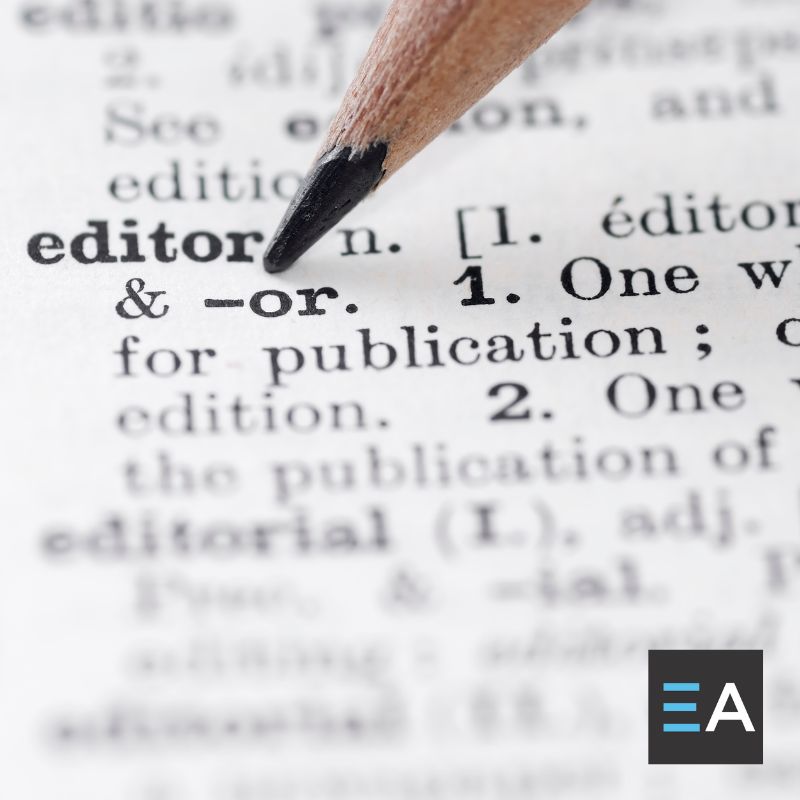
What Does a Book Editor Do?
October 14, 2020
Indie Book Marketing Ideas
October 21, 2020Cost of Editing a Book

Editing is an exciting step toward finishing your book. A professional editing service will prepare your manuscript for a literary agent’s critical eye and for the world to read once your book is published!
Partnering with a professional editor is an investment in your book’s success. However, there are costs associated with editing, so it’s important to understand basic pricing and what factors affect the cost.
The cost of editing a book: Hiring a book editor
Whether you’re going to self-publish or work with a traditional publishing company, it’s important to know what to expect throughout the editing process. The first step is to research average rates for three of the main phases of editing: developmental editing, line editing, and copyediting.
How much does developmental editing typically cost?
Developmental editing is your book’s first overall manuscript assessment. To that end, developmental editors review your book as a whole. They make sure the plot flows well, that your characters are developed, and that any historical facts are accurate.
On average, developmental editing costs around $0.09 per word, $22.50 per page, and $112.50 per hour.
How much does line editing typically cost?
The line editor looks at your tone, word choice, and sentence structure. This helps your book maintain a consistent mood throughout every paragraph.
The industry average for line editing is about $0.05 per word, $12.50 per page, and $62.50 per hour.
How much does copyediting typically cost?
Copyediting focuses on the nitty gritty. Your copyeditor puts your manuscript under a microscope to find any punctuation, spelling, or grammatical errors.
Average costs for copyediting are $0.03 per word, $7.50 per page, and $75 per hour.
The cost of editing a book: Hiring a professional editor
Every book needs to be edited before it’s published. Without editing, your manuscript could contain errors that you don’t want the public to see. A professional editor can catch issues from your book’s organization all the way down to a small typo.
If you’re working with a traditional publishing company, your book deal might include editing services. And if you’re self-publishing, you’ll definitely want to hire an editor. Let the professionals prepare your book for the world!
How does an editor offer a new perspective?
You’ve spent a lot of time on your book. And since you’re so engrossed in the writing process, you might not notice certain plot issues or typos. So you need an editor to look at your manuscript with fresh, unbiased eyes. Furthermore, they can offer a new perspective, ideas, and suggestions you might not have thought about.
Why should you look to an editor for an objective appraisal?
A professional editor will approach your work objectively. They’ll thoroughly review your manuscript and provide constructive feedback on how to fix any issues. They edit books for a living—so they know a thing or two about the publishing industry that you’re not aware of!
Your editor wants to help your book succeed. So be prepared for some suggestions on how to improve your manuscript. And remember: even if the editor suggests major changes, they’re trying to help you ring up those book sales!
How can a professional editor save you money?
Editing prevents you from publishing a book with plot inconsistencies, grammatical errors, and misspelled or misused words. If your manuscript is riddled with problems, your readers won’t take you seriously as an author. And you will have wasted time and money publishing a book that no one wants to read.
So invest in your book and in your success as a professional writer. Hire a professional editing service!
The cost of editing a book: An estimate
Your book needs a comprehensive edit before you publish it. So it’s important that you allocate some time and resources to the editing process. From the developmental edit down to your line editing service, you must be aware of your editing costs.
How does the length of your book factor into the cost of an editing service?
Editors base their rates on quantity of words, pages, or how many hours your book will take to edit. So your book length is a determining factor in your editing cost. For example, a full-length novel will take more time—and therefore cost more—to edit than a children’s picture book.
What types of books cost more to edit?
The main factor in your editing cost is your book’s length. But there are other elements to consider as well. Here are a few things to keep in mind:
- Historical facts. Your developmental editor will confirm any historical facts in your book. So if you’ve written a nonfiction work, your cost may be higher than a fiction manuscript.
- Manuscript’s condition. If cost is a concern, ask a friend or family member to read your work before you send it to a professional editor. They might be able to catch any glaring errors that an editor won’t have to fix. This makes the editing process go more quickly, which saves you money!
- Book cover. Some editing companies offer book cover services. But if you’ve already designed the layout and written the text for the front, back, and spine of your book, you won’t have to pay for these services.
How does your deadline impact the cost of an editing service?
If you have a tight editing deadline, you might need to pay a rush fee to get the work done more quickly. And if you don’t have a deadline, you can pay standard editing rates. But be sure to communicate your timeline to your editing service before signing on with them.
How long does it take to edit a manuscript?
The time it’ll take a professional editing service to edit your manuscript depends on a few factors:
- Length of the manuscript
- Condition of the manuscript
- Your deadline
Each editing phase is unique—just like your book! And although there’s no universal answer to how long your editing process will take, there are some basic industry standards.
How quickly does a developmental editor work?
Your developmental editor will read your book as a whole and provide an overall manuscript critique. The developmental editor needs to thoroughly read your book and keep notes on your plot and characters and confirm any historical facts in your manuscript. Thus, this edit takes time. In general, developmental editors complete about five pages per hour.
How many pages can a line editor complete per hour?
The line editor will make sure you’re using each word correctly and that your sentences are constructed well. On average, professional line editors complete about five pages per hour.
How long does heavy copyediting take?
Oftentimes, a line editor will catch a lot of the same errors that a copyeditor would. In that case, your book will go through a light copyediting process. A copyeditor tasked with light editing or proofreading can edit around ten pages per hour.
If you forego the line edit, you’ll need heavy copyediting. And depending on the condition of your manuscript, your copyeditor can likely complete around seven pages per hour.
The cost of editing a book: Average freelance editing rates
You have options when you research your editor. Maybe you know a professional editor, and they’re willing to freelance for you. Or maybe you’ve already performed a substantive edit, and you only need help with copyediting.
If you choose a freelancer, make sure they’re reliable and professional. Look for someone involved in a professional editorial freelancers association so they’ve been vetted by other writers.
What is the industry standard for words per page?
The writing industry’s standard is 250 words per page. Editing rates are calculated per word, per page, or per hour. So ask your editing service how it estimates its rates for editing your book.
What other editorial services should you consider in addition to book editing?
You know that editing is important. And if your goal is to become a professional author, you might need editorial services beyond your manuscript.
A professional writer needs to market their work. This includes a website, social media presence, and other marketing platforms that broadcast your book to the world. Some editorial services can help with these projects too!
How do you estimate the cost to have your book edited?
It’s hard to budget for your book edit if you don’t know how editing rates are calculated. The first question to ask is whether your editing service estimates its rates based on word count, page count, or per hour. The next thing to consider is your timeline. Although an editing service can work under a tight deadline, you might have to pay rush fees.
How to save money on the cost of editing a book
Everyone wants to save money. And if you’re an indie author, you might not have a big editing budget. Fortunately, there are ways to save money on editing.
What is an economical way to pay for editing and proofreading services?
Some editing services let you pay in increments rather than the full amount up front. This can help with budgeting. And if you’ve already asked some family and friends to read your work, you might not have to pay for developmental editing. So be sure to let your editing service know if you only need a proofread or a copy edit instead of all phases of the editing process.
Your editor might offer an indie author discount. So if you’re just starting out with your first manuscript, be sure to ask if they offer any financial assistance!
What are the benefits of bundling editing services?
Each editing phase costs money. But sometimes you can get a bundled cost that’ll reduce the price! If you need everything from the developmental edit down to proofreading, ask your editorial service if they offer the full package at a discounted rate. You could get the same excellent service for less money.
What should authors avoid doing when they are looking to save money?
Hiring a book editor is a financial commitment. Think of it as investing in your book and in your career as an author. So although it’ll cost a bit of money, you have to avoid cutting corners.
Editing prepares your book for your readers. You worked too hard on your manuscript to send it into the world with plot issues or misspellings. So find an expert editor to help you. The up-front cost of hiring a professional editor will pay off when you start ringing up those book sales!
How to evaluate freelance editorial services
Everything from developmental editing to copyediting is an investment in your book. And it’s important to find an expert editor that you can trust. Take these steps before selecting an editor:
- Learn their communication style.
- Get a sample edit.
- Review their references and testimonials.
How do you judge an editor’s communication style?
Your editor should be an excellent communicator. For instance, they should clearly explain their rates and timeline. In addition, during the project, they should provide constructive recommendations on how to fix any issues.
Finding the right editor means finding someone you’re comfortable with. So communicate with each potential editor to find the best fit.
Why should you consider the quality of a sample edit when considering a freelance editor?
Your manuscript deserves the best editor money can buy. So ask for a sample edit from any potential editors. This will let you compare their work, review their attention to detail, and find the right editor for your project.
Why should you look for a freelance editor with references and testimonials?
An expert editor should have a group of happy clients. Read their website and online reviews to make sure other writers have been impressed with their service. If a freelance editor doesn’t have willing references and positive testimonials, chances are their work is subpar.
Elite Authors is your affordable and comprehensive editing service.
You need an editorial service with expert editors who can work efficiently—even on a budget! We can turn even the roughest manuscript into a publish-ready book. Contact us to get a quote!


